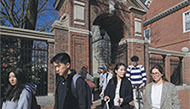▶ Los Angeles Survival (30)
They purchased a house near the USC campus, on West 36th Street. It was a large house. Upstairs were four bedrooms, a hallway large enough that, later, USC football players occupying rooms practiced signals there. Also a small porch was off one corner. Downstairs were two bedrooms and the Lims had the luxury of a bedroom each, like rich people. There was a large living room with a swinging door leading into the dining area and kitchen, and there was a basement that served for the laundry room. The house was built when American families were large, housing a family plus grandparents or pensioners. It was a period when families mattered and took care of their own, a lifestyle much referred to today by politicians and moralists. What would the Lims do with so much space? The answer was right before them: Hazel and her husband. While they studied investments in Los Angeles, they needed temporary housing. Why not rent one of the upstairs rooms? So the Lims were back in business, they were landlords.
Mr. Lim? youngest son was an architect who was a Frank Lloyd Wright disciple. However, Mr. Lim had no such fancy ideas in his mind. Just rooms to let. He set about redesigning the floor plan for maximum usage as well as income, and being a good landlord.
The house not only provided income, it became Mr. Lim? hobby and playhouse. Finishing with the additions to the upstairs, he looked around for more to do. He found it in the four garages in the rear of the house. Too small to fit the modern automobile, having been measured for the Model-T Fords, he renovated the spaces for three of his haraboji friends. And charged no rent, because they were retired too, and living the lonely life of old bachelors. Marjorie once said her father was a generous person with his friends but when she asked for $l5 to buy new dresses when she was in high school, he gave her $l0 and told her to buy thriftily and with care. But the harabojis and Mr. Lim were rewarded with Mr. Lim? remodeling. For one long spring and summer the men and Mr. Lim played cards and visited in the backyard. Their companionship was a delight to see. Hazel asked me to come over, there was something for me to behold. When I arrived she led me to the back porch and pointed to the yard, "Look there." ?here was a spot on the grass where a card table was set up and four men playing cards. A shout went up and then laughter, directed at Mr. Lim who looked sheepishly back at the others. This idyllic moment lasted a year and then disbanded. It was over a code violation; garages were meant for automobiles.
No sooner had Hazel and Yobo (her husband? name was Young Hee Kim, and he earned the nickname when he played football at the University of Hawaii. After graduating, he joined the fire department in Honolulu. Koreans were proud of his prowess as a football hero and fire fighter. He served in the Army, in the Pacific theater of war,) moved into the upstairs room when their threefold plan began to unroll. First, a business was found to invest their money. It was a plastic toy factory, its bestseller a plastic peashooter. Her brother Peter Lim, who was an investment broker, said they could not lose: by Christmas a million peashooters at a dollar a piece would be sold. They sold well indeed?or not very long afterward the government banned the sales. Too many children swallowed the plastic pea instead of aiming at intended victims. The news of the government ban was mitigated when doctors announced Hazel was pregnant and of course to Hazel it was banner headline news. What was a plastic toy compared to the baby she carried? Yobo decided they must have an apartment to bring the baby home from the hospital. Buying a home could wait. They moved so Hazel would not have the stairs to climb. During the move, Yobo caught a cold that persisted and he became easily tired and not himself. He saw a doctor who referred him to the VA facilities in Brentwood when he could not get at the source of the cold, and told Yobo that veterans who showed tropical disease symptoms (fever, listlessness, inability to function normally) were to be sent to the VA. The government did not want strange South Pacific diseases taking hold in the country. What VA discovered after testings was Yobo had cancer of the liver. Two months later he died. He did not live to see his child. Hazel got through the trauma of this period, it was wonderful to see her cope.
The parent Lims invited her home and Mr. Lim gave up his room. Mrs. Lim willingly gave up the privacy she had cherished. Now she had Mr. Lim? company and also his snoring, which she complained bothered her sleep. So Mr. Lim willingly moved his bed under the stairwell in the hallway. Hazel came home with baby Kathy, the name she gave the baby, saying the sound of it made her think of writers and maybe the girl would grow up to be one. The child? talent turned to music instead. At three years old, she listened to her mother playing the piano; it was the same piano the Lim children practiced on years before. Kathy came over to her mother and said, "Show me," and pointed to the keyboard. Hazel gave her a quick lesson of the notes and the girl said she wanted to try. She picked at the keys and surprised her mother, playing the music she heard. Hazel could not believe what she was hearing and told her to do the exercise again. Kathy complied. She played by ear until she was about seven when she discovered friends. The little Mozart abandoned the piano to play with the next-door neighbor who was a black girl. Sharyn was a year or two older and in school. Kathy emulated her and soon the two girls lived in each other? home. Sharyn tasted kimchee and fell addicted to kimchee. She and Kathy gorged on it one day and were stricken, they? eaten too much. Mrs. Lim returned to the kitchen in time to save them from bloating?er remedy: table sugar and the two became inseparable kimchee companions.
Mr. Lim died of stomach cancer. He lived to enjoy his retirement house for more than a decade. When he died and the funeral was over, Mrs. Lim said she
regretted complaining about his snoring. remembered when loved ones no longer are with us. It was after his death Mrs. Lim asked me to have cooksoo (noodle) with Hazel. I was in her house often but casually, "just dropping in" to see Hazel. This however, Hazel told me, was a social invitation and warned me her mother never permitted smoking, and would I remember not to light a cigarette. For a good bowl of her noodles I would forgo anything, as I had heard from my brother Sam that no cook prepared cooksoo like Mrs. Lim?. The lunch was delicious. For dessert, she brought in fruit and coffee, and when that was consumed I prepared to get up. But no, Mrs. Lim came in with an ashtray and matches and said, "You smoke, please." Hazel? face fell, she didn? know what to say after what she had warned me not to do. She spoke to her mother in Korean and Hazel translated, "You are a special guest and you must smoke." I didn?, though. I thanked her anyway and I thought her kindness accepting me and my eccentricities without question was rewarding me as her daughter? friends. Hazel and I were friends until she died in l996, far off in Honolulu.
The story of Hazel and her daughter have been included in the Lims retirement house. Outside of the parent Lims, the two were the longest residents in the roominghouse enterprise. There is son Peter? story too. He had forgone college in order to help the Lims run their neighborhood grocery store, which was near Polytechnic High School and no other food store was nearby. The hours were 6 am to about 7 pm., long hours for two persons to handle. And there was the marketing in the early morning hours. So Peter was a partner. Mrs. Lim arranged a marriage for him and thought the couple would be happy. There was the big wedding, dear to all the other girls hearts. After the store was sold, Peter who was an inventive person worked in his workshop with ideas that sold. He also was an investment broker, bringing together Koreans who wanted to earn interest on their savings with those needing a loan. Everybody in the community knew him and kept him busy. After World War II, he bought a home in Baldwin Hills. Hazel took me to see the house which was large and modern. Soon after the visit, Peter and his wife separated. Their son and daughter were adults and not living at home. It was odd how the children held parents together and when they left the nest, the parents flew apart too, to go their way. Peter bought a small travel lodge in China Lake and came in to see his mother and Marjorie, after Hazel moved to Honolulu in l963. Driving by I passed it after Mrs. Lim died and it was sold. It was sad to watch it deteriorate, in fact the entire area was going to seed until the l984 Olympic Games, when the city refurbished the streets around the Coliseum so the visitors would see Los Angeles as the coming center of the Pacific world. The houses on West 36th Street benefited with a paint job, but it would not look like the retirement home the Lims had lived their last years. They were happy years and there was a shine about it. All old people should have so good a life.
스마터리빙
more [ 건강]
[ 건강]이제 혈관 건강도 챙기자!
[현대해운]우리 눈에 보이지 않기 때문에 혈관 건강을 챙기는 것은 결코 쉽지 않은데요. 여러분은 혈관 건강을 유지하기 위해 어떤 노력을 하시나요?
 [ 건강]
[ 건강]내 몸이 건강해지는 과일궁합
 [ 라이프]
[ 라이프]벌레야 물럿거라! 천연 해충제 만들기
 [ 건강]
[ 건강]혈압 낮추는데 좋은 식품
[현대해운]혈관 건강은 주로 노화가 진행되면서 지켜야 할 문제라고 인식되어 왔습니다. 최근 생활 패턴과 식생활의 변화로 혈관의 노화 진행이 빨라지고
사람·사람들
more
[한인단체 신년 인터뷰] KYCC 송정호 관장… “지역사회 위한 종합 서비스 강화”
LA 한인타운 대표 비영리단체 한인타운청소년회관(KYCC)의 송정호 관장은 “지금 우리가 하는 일은 커뮤니티 ‘니즈’가 있기 때문에 존재한다”…

[한인단체 신년 인터뷰] LA 평통 장병우 회장… “본연 역할로 한반도 평화 실질 기여”
민주평화통일자문회의 LA협의회(이하 LA 평통) 장병우 회장은 6일 본보와의 신년 인터뷰에서 붉은 말의 해인 병오년 새해를 맞아 신년 화두로 …
워싱턴주에 첫 한인 시의장
워싱턴주에서 첫 한인 시의회 의장이 탄생했다. 제이슨 문(한국명 문태원) 머킬티오 시의원이 새해 들어 시의장으로 선출되며 또 하나의 중책을 맡…
국회 방문단 대한인국민회 방문
윤후덕·이해식·김한규 의원과 조오섭 국회의장 비서실장 등 10여 명의 한국 국회방문단이 지난 5일 LA를 찾아 로즈데일 묘지와 국민회관 등 미…
[한인단체 신년 인터뷰] 명원식 파바월드 회장… …
“한인 차세대들이 바르게 자랄 수 있는 토대를 만드는 것이 제가 파바월드의 회장으로 존재하는 유일한 이유입니다”한인사회의 대표적 청소년 봉사 …
많이 본 기사
- 트럼프 “이민자 시민권도 박탈한다”
- LA 길거리 매춘 단속 대폭 강화… “고객도 처벌”
- 인앤아웃서 100달러 위폐 12개 매장 사용 2명 체포
- 재외국민 4분의 1이 노인 ‘초고령 사회’
- ‘나혼산’, 다 거짓? “박나래 남자친구도 새벽 회동..반려견 복돌이 돌본 적 없다” 前 매니저 반격
- “한인 프리스쿨서 4세 여아 성추행 피해” 주장
- H-1B 비자 등 최대 3천달러 육박… 이민 신청 급행 수수료 또 오른다
- “집값보다 무서운 유지비”… 올해도 재산세·보험료↑
- ‘코요테 주의’… 남가주 주택가서 급증
- 에어프레미아, 연중 최대 할인
- “귀화 시민권 박탈 기준 검토” 파장
- 연방하원 본회의서 나온 한국어 인사… “김영옥 누나, 감사합니다”
- VA 페어팩스 세금 폭탄에 기업·주민‘탈출 러시’우려
- ‘ICE 총격’ 주말 미 전역 항의 시위
- 새 VA 주지사는 의원을 좋아해
- “최대 6천불 추가 공제돼요”
- ‘도심 한가운데 나타난 소떼’
- 내 개인정보 모두 다크웹에?… 지금 당장 해야 할 일들
- 더욱 건강한 새해 위한 ‘웰빙 실천’ 습관 7가지
- 보아, SM과 25년 만에 작별… “한류 개척한 ‘아시아의 별’”
- 타운 구리선 절도 기승… 어두운 밤거리 ‘치안 불안’
- ‘좀비(zombie)체제’가 무너질 … 1
- 가주 부유세 도입 추진 ‘탈 캘리포니아’ 현실
- 마두로 체포 특수작전이 부러운 中… “오랜 추구에도 한계”
- 워싱턴 일원 홈스쿨링 학생‘급증’
- 베네수엘라 민병대 위협에 미, 자국민 즉시출국 권고
- 케데헌 ‘골든’ 글로브 이어 K팝 최초 그래미 수상도 노린다..로제 ‘APT’와 맞대결
- 놀라운 투자결과, S&P 500
- [조지 F. 윌 칼럼] 트럼프의 무면허 괴물 사냥
- LA교육구 개학… ‘교내 셀폰 금지’
- 운이 가득한 2026년을 기원하며
- 흔들리는 OPEC…트럼프, ‘세계 석유 지도’ 다시 그리나
- 돈로 독트린
- [만화경] 그린란드의 하얀 금
- “김치 섭취 건강에 유익” 미 정부 식단지침 권고
- H마트 새해도 전국 확장… 일리노이주 초대형 매장
- “베네수 원유 판매금 미 계좌 예치”
- 이란 시위 사망자 폭증… 트럼프, 이란 군사개입 준비 착수
- [인터뷰] “최고의 경영 강좌… 강력한 네트웍 강점”
- 새해 통신·구독료 줄이자… 휴대전화·인터넷 요금 점검부터
- 중수청·공소청 베일 벗었다… ‘9大범죄 수사’ 중수청 조직이원화
- 시니어들 상황별 리버스모기지의 선택(2)
- [진격의 K 휴머노이드] 로봇 관절·두뇌·눈까지… 부품 ‘블루오션’
- “모기지 금리 인하 위해 2,000억달러 투입”
- 다시 명문대를 찾는 기업들
- ‘케데헌’, 골든글로브 애니메이션상·주제가상 2관왕
- xAI, 이미지 기능 제한 ‘성착취’딥페이크 논란
- 사우디에 트럼프골프장·호텔…트럼프 가족회사, 100억달러 사업
- ‘날벼락’ 김혜성 WBC 사이판 가 있는데→LAD 갑작스러운 ‘경쟁자 2명 영입 확정’ 주전 경쟁 더 험난해지나
- 명문대 입시에서 리서치 경험이 갖는 진짜 의미
1/5지식톡

-
 한국 안경을 무료 배송으로 받아보실…
0
한국 안경을 무료 배송으로 받아보실…
0안녕하세요. 서울 안암동에 위치한 ‘보고싶다 안경원’입니다.저희는 다년간 한국 고객분들께 착용감 좋은 안경테와 한국안경브랜드,고압축 도수 렌즈를 합리적인 가격에 제공해온 안경 전문점입니다.이번에 해외 배송이 가능해…
-
 미 육군 사관학교 West Poin…
0
미 육군 사관학교 West Poin…
0https://youtu.be/SxD8cEhNV6Q연락처:wpkapca@gmail.comJohn Choi: 714-716-6414West Point 합격증을 받으셨나요?미 육군사관학교 West Point 학부모 모…
-
 ☝️해외에서도 가능한 한국어 선생님…
0
☝️해외에서도 가능한 한국어 선생님…
0이 영상 하나면 충분합니다!♥️상담신청문의♥️☝️ 문의 폭주로 '선착순 상담'만 진행합니다.☎️ : 02-6213-9094✨카카오톡ID : @GOODEDU77 (@골뱅이 꼭 붙여주셔야합니다…
-
 테슬라 자동차 시트커버 장착
0
테슬라 자동차 시트커버 장착
0테슬라 시트커버, 사놓고 아직 못 씌우셨죠?장착이 생각보다 쉽지 않습니다.20년 경력 전문가에게 맡기세요 — 깔끔하고 딱 맞게 장착해드립니다!장착비용:앞좌석: $40뒷좌석: $60앞·뒷좌석 …
-
 식당용 부탄가스
0
식당용 부탄가스
0식당용 부탄가스 홀세일 합니다 로스앤젤레스 다운타운 픽업 가능 안녕 하세요?강아지 & 고양이 모든 애완동물 / 반려동물 식품 & 모든 애완동물/반려동물 관련 제품들 전문적으로 홀세일/취급하는 회사 입니다 100% …
케이타운 1번가
오피니언
 옥세철 논설위원
옥세철 논설위원‘좀비(zombie)체제’가 무너질 때…

돈로 독트린
 조지 F·윌 워싱턴포스트 칼럼니스트
조지 F·윌 워싱턴포스트 칼럼니스트 [조지 F. 윌 칼럼] 트럼프의 무면허 괴물 사냥
 전지은 수필가
전지은 수필가 승리의 여신은 언제까지?
 신경립 / 서울경제 논설위원
신경립 / 서울경제 논설위원[만화경] 그린란드의 하얀 금

무분별 이민 단속이 불러온 비극

무면허 건축업자 피해 근절돼야
 메건 매카들 워싱턴포스트 칼럼니스트
메건 매카들 워싱턴포스트 칼럼니스트 [메건 매카들 칼럼] 마두로는 체포했지만… 베네수엘라 석유 생산 회복은?
 김미선 서북미문인협회 회장시인
김미선 서북미문인협회 회장시인 [한국춘추] 새해, 북방의 한국인을 생각하며
1/3지사별 뉴스

‘ICE 총격’ 주말 미 전역 항의 시위
미네소타주 미니애폴리스에서 연방 이민세관단속국(ICE) 요원의 총격에 30대 시민권자 여성이 사망한 사건에 항의하는 대규모 시위가 주말동안 뉴…
“귀화 시민권 박탈 기준 검토” 파장

새 VA 주지사는 의원을 좋아해
민주당 아비가일 스팬버거(Abigail Spanberger) 버지니아 주지사 당선자는 오는 17일 취임을 앞두고 내각 인선을 거의 마무리한 상…
VA 페어팩스 세금 폭탄에 기업·주민‘탈출 러시’우려

국토안보부, ‘시위 확산’ 미네소타에 법집행인력 추가 파견
미네소타주 미니애폴리스에서 이민세관단속국(ICE) 요원의 민간인 총격 사망 사건이 발생한 이후 주요 도시에서 반발 시위가 확산하는 가운데 국토…
살림으로 뿌리내리다- 테이크루트 안미정 대표의 요리 이야기 (9)

오늘 하루 이 창 열지 않음 닫기 


















































.png)


댓글 안에 당신의 성숙함도 담아 주세요.
'오늘의 한마디'는 기사에 대하여 자신의 생각을 말하고 남의 생각을 들으며 서로 다양한 의견을 나누는 공간입니다. 그러나 간혹 불건전한 내용을 올리시는 분들이 계셔서 건전한 인터넷문화 정착을 위해 아래와 같은 운영원칙을 적용합니다.
자체 모니터링을 통해 아래에 해당하는 내용이 포함된 댓글이 발견되면 예고없이 삭제 조치를 하겠습니다.
불건전한 댓글을 올리거나, 이름에 비속어 및 상대방의 불쾌감을 주는 단어를 사용, 유명인 또는 특정 일반인을 사칭하는 경우 이용에 대한 차단 제재를 받을 수 있습니다. 차단될 경우, 일주일간 댓글을 달수 없게 됩니다.
명예훼손, 개인정보 유출, 욕설 등 법률에 위반되는 댓글은 관계 법령에 의거 민형사상 처벌을 받을 수 있으니 이용에 주의를 부탁드립니다.
Close
x